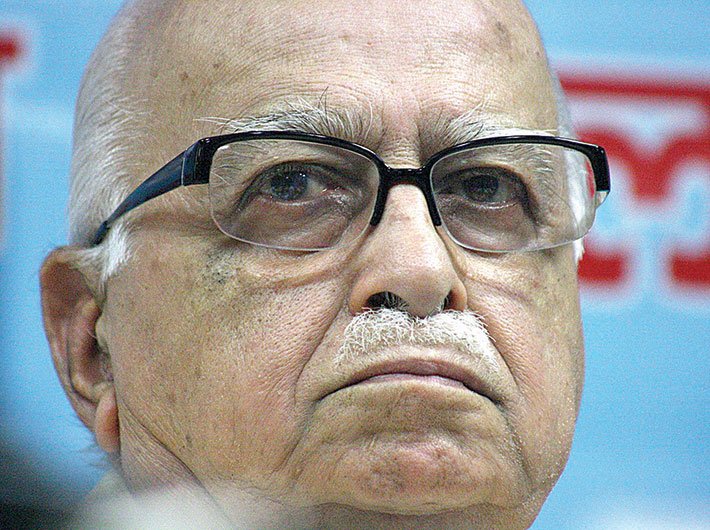For a man who changed the destiny of the nation – not to mention the fortunes of his party, it is ironical that luck has ultimately not favoured him.
The ideology of Hindutva has been around since the early decades of the 20th century, but it was Advani which gave it political currency. Today, it has become the default ideology for the nation, but, as the Supreme Court puts him in the dock for conspiracy in the Babri demolition case, the man himself has nothing left but the loneliness of a futile long-distance runner in his last lap.
Read: LKA built BJP from bootstraps, remember?
For the BJP, hardline Hindutva was a necessity: the party had debuted in the Lok Sabha in 1984 with just two seats (in the aftermath of the Indira Gandhi assassination and the resulting sympathy wave for Rajiv Gandhi). The number rose to 84 in the next elections (in the aftermath of Rajiv losing popularity due to the Bofors scandal but also due to the Ram Janmabhumi campaign, which Advani, as the new party president, had launched).
In retrospect, the Ram Janmabhumi agitation, demanding construction of a temple in the spot claimed to be Lord Ram's birthplace – where the Babri mosque stood, seems like a God-given platform for Hindutva. It brought out the all the themes together – facts and myths of Islamic invaders who razed Hindu temples and the need for Hindu resurgence – with the emotional backdrop. No wonder, the Vishwa Hindu Parishad had been demanding it. But it was Advani’s acumen that made him and the BJP spearhead the movement and exploit its political potential.
Barring the JP movement of the mid-1970s, no other political campaign in independent India captured the imagination of the people the way the Advani-led Ram Janmabhumi movement did. And no other campaign was so carefully crafted. Eyewitnesses report that after the symbolically-rich Toyota rath yatra passed their village, many people in the Hindi heartland used to take a pinch of dust from the road and put it on their head. The slogan, 'Bachcha bachcha ram ka, janmabhoomi ke kam ka', had resonance among kids, and another one, 'Garv se kaho hum Hindu hain' was finally promising to bring Hindutva out of closet.
Between Vajpayee before him and Modi after, Advani has often candidly confessed that he is not the kind of orator who can move masses. But in those eventful days, he surprised himself by moving masses (leading to even riots in some places). Few political leaders have such a way with language as Advani, who coined the term ‘pseudo-secularism’. Is there any other term put to use in so many contexts, as reply to so many arguments, ironing out so many difficult nuances? Modi followers’ penchant for the term ‘nationalism’ is a reworking of Advani’s original.
The divisive agenda also served another purpose – of keeping the flock together against the onslaught of VP Singh’s social engineering during the battle of two ideologies that were shorthanded to Mandal and Kamandal.
For somebody who was to later discover secular virtues in Mohammed Ali Jinnah, one wonders if Advani was aware of the costs of his politics. But he did give political legitimacy to Hindutva and the BJP’s tally has rarely dipped afterwards.
That is why even when Vajpayee became the prime minister, many thought he was only a more acceptable mask and Advani was the one who really called the shots. In 2004, when the BJP surprisingly lost to the Congress, the prime ministerial candidate was Vajpayee, but in 2009, it should have been a walkover for Advani as prime ministerial candidate. Against a puppet-like Manmohan Singh, his projected himself as a decisive leader. And yet the Congress managed to beat anti-incumbency and achieved a rare feat in recent times – a second consecutive term.
That was when the luck turned against him, pushing him to the point where even a usually timid Manmohan Singh could tell a press conference that Advani needed to change his astrologer.
The final insult was to come from someone rightly or wrongly perceived as his protégé. Right when the Congress was ready to be defeated by whoever came first, Modi seized the mantle, won, and launched a new era of Hindutva, ending Advani’s era.
Read: Behind-the-door story of Advani's resignation
The curtains formally came when, replying to Advani’s graceful comment that the party would be grateful to Modi, he curtly said the veteran leader was wrong, and then went on to add platitudes of how he always considered the party was bigger than any individual.
Read: Modi, Advani and mysterious symbolism of public gestures
Advani has been a lonely leader of late. Ironically, even the cause of Ram Janmabhumi which once put masses behind him won’t bring him out of his political vanvas today.

